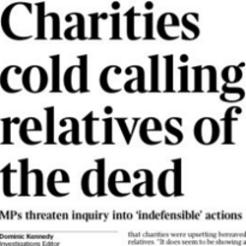The vice chair of an All Party Parliamentary Group has threatened to launch an inquiry into charities legacy fundraising practices, after the Times attacked the sector on its front page for the second day in a row.
Mark Pawsey, Conservative MP for Rugby, is quoted in a story in the Times this morning criticising charities. The newspaper said are “trawling through public records of wills so that they can chase bereaved relatives for gifts”.
Pawsey said the alleged behaviour by charities “seem to be showing a lack of sensitivity” to the recently bereaved and said his parliamentary panel would consider an inquiry into the process if it “emerged that charities were upsetting bereaved relatives”.
The Times suggests that legacy fundraising is worth an “estimated £2bn a year” to the sector in terms of bequests.
It also quotes an “anonymous whistleblower” from an unnamed charity, who said that “tip-off fees” paid by charities to legacy fundraising agencies “was dwarfed by the income produced by wills”.
Times: ‘Charities cold calling relatives of the dead’
The Times has run an attack on the charity sector for the second day in a row, today accusing charities of harassing relatives of the recently deceased to raise money from wills and bequests.
The piece, which features the headline ‘Charities cold calling relatives of the dead’, centres around a case study on the RSPCA and its use of legacy agency Smee & Ford to alert it to mentions in wills.
Times journalist Dominic Kennedy was passed on correspondence between the charity and a woman after the death of her mother. “Couched in sympathetic language,” wrote Kennedy “the underlying message was brutally plain. Has your father died and, if so, can we expect a cheque?”
The woman in question said that the charity wrote to her after the death of her father and said “I understand that your mother has very generously bequeathed a legacy of £500 to the RSPCA in the event that her husband did not survive her. We would be grateful if you would confirm whether the information we have received is correct.”
The woman wrote back to RSPCA and said her father was still alive and that “no legacy in favour of the RSPCA is due from my mother’s will”.
She also said that the RSPCA behaved in a “disgusting manner” and claimed she had “no idea that donations people give to charities are used to pay agents”.
RSPCA response
A spokesman for the RSPCA told Civil Society News that the use of legacy agencies is not unique to the charity and defended the organisation’s contact with the woman in question as “appropriately respectful and compassionate”.
“Legacy income pays for one out of every two animals we save and without it much of our work would not be possible. We are immensely grateful for the kindness of people who choose to remember the needs of animals in their will.
“We were sorry to hear that this lady was upset to be contacted four months after her mother’s death. Once a will has been admitted to probate it becomes a public document. Probate was granted in February and we did not make contact with her for a further three months.
“We are respectful of people’s grief when they have lost a loved one and strive to correspond with our supporters and their families in a compassionate and appropriate way. We will continue to ensure we uphold the highest standards expected of us.
“We believe our correspondence was appropriately respectful and compassionate and we are very grateful her mother had considered the work of the RSPCA to have been worthy of such practical support.”
The Times highlighted the use of legacy notification services used by charities including the RSPCA. The use of such services is common practice amongst charities.
Polly Avgherinos, S&F director, said: “Smee & Ford has for many years provided a well-established and highly respected notification service to charities which helps ensure that legacy donations are fulfilled. Legacies provide important income for charities and, based on the potential for fraud, mistakes or slow processes, these essential services safeguard those organisations who wish to receive information about donations.
"Smee & Ford issues guidance and best practice advice for charities around how they should contact executors once probate has been granted and we are not aware of any complaint against Smee & Ford.”
Karl Wilding, director of public policy at NCVO, said: "It’s right and proper that the media hold charities to account.
"Today’s story, based on one complaint, however, hardly justifies the front page: many people remember the charities they love in their wills and it is perfectly normal for charities to then follow up on those gifts when they have been notified of them.
"There have been many examples of poor fundraising practice over the summer, but this is not one of them."
Chris Millward, chief executive of the Institute of Legacy Management, said: “We must remember that legacy gifts to charities are a legal entitlement and as such they need to be managed in a specific way.
"However, charities are acutely aware that legacy giving can be a difficult subject and the majority are extremely professional in their management of the necessary processes with sensitivity and compassion.
"The balance is in fulfilling the legal obligation while realising the wish of those generous supporters who have made deeply personal decisions about wanting to leave a gift to charity that means something to them and reflects their own values.”









